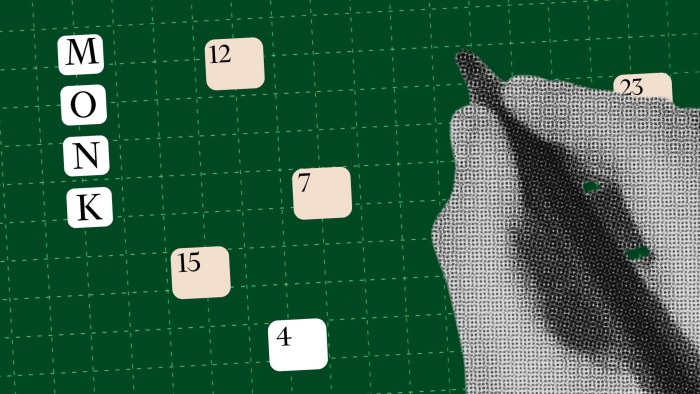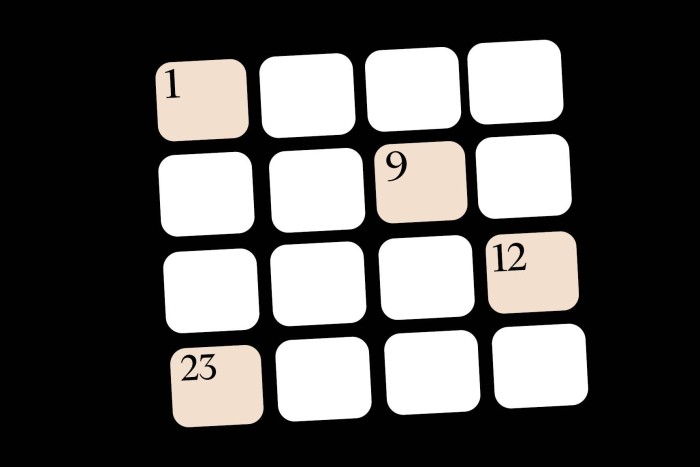Behind the scenes: who are the FT’s crossword compilers?

Roula Khalaf, Editor of the FT, selects her favourite stories in this weekly newsletter.
Your setter/compiler handle/pseudonym/alter ego Monk.
Why? “M on K”, my initials. And, increasingly, the monastic tonsure forming on my ageing pate.
Real name Mark Kelmanson.
Where are you? West Yorkshire, a hat’s throw from Ilkley Moor.
Years compiling 30.
And measured in number of crosswords 600 professional puzzles.
Full time or part-time with another job? Very much part-time. Formerly alongside an academic career in applied mathematics, presently alongside drystone walling, hiking (plus or minus dogs), harmonica playing and diverse fettling.
Did your school mention crossword compiling in career discussions? You are kidding! As a sixth-former in the mid-1970s, I was advised to do a chemical engineering degree in order to cash in on the industry boom around emergent North Sea oil. I lasted six weeks, then transferred to maths, at the end of which the university careers service advised me, mainly on the basis of my short hair, walrus moustache, physique and tracksuit, to join the army. I stayed in academia.
Who/what got you into cryptic crosswords? As per many of my generation, solving the Sunday Express “Skeleton” puzzle with my parents.
Walk us through your compiling strategy Always in the late evenings and small hours. After filling a grid, invariably hiding a hidden phrase, clueing follows in natural order. I do not cherry-pick the “best” answers first, thereby not ending up with an accumulation of “boring” words — the compiling analogue of coffee creams prevailing in a near-empty box of Quality Street. This usually takes two two-hour sessions. After a gap of a few days, I revisit the clues and change (often the majority of) them. Then comes my wife’s test of the “surface readings”. As a non-solver, she can assess without bias if the clues are credible sentences in their own right. After another couple of days, any weaker/looser ideas are re-tweaked and only then is the puzzle sent to a tester, a strong solver who is honest enough to give technical, meaningful feedback.
So you think you’re hard I don’t, but many do, presumably as I aspire to write clues with smooth, credible surface readings that mask intricate orchestration of wordplay. That said, I definitely try to avoid using obscure elements for their own sake.
The clue you wished you’d written Never even thought about this, because the best clues arise via so many different paths. There have been more than a few clues in the Times that have led to brilliant penny-drop moments, but I simply admire them rather than wish they had been mine.
Interactive crosswords on the FT app

Subscribers can now solve the FT’s Daily Cryptic, Polymath and FT Weekend crosswords on the iOS and Android apps
And the clue you’re glad you did Having written 20,000 clues (my poor wife!), it is impossible to pick a favourite, not least as I have zero recollection of the vast majority of them. I have had some very risqué clue ideas that made me laugh out loud uncontrollably but, outside of Viz, no outlet could possibly print them.
What’s the topic of conversation when you come across other compilers? Alcohol, dogs, topical puzzles and the finer points of accurate clue grammar. More or less in that order. And a lot of current affairs. Pretty much nothing, alas, on “shed-man” things: oh to find even one other compiler keen on refurbing a cordless-screwdriver gearbox or retempering drystone walling hammers.
Any advice for solvers? As with most other things, you will get better with practice and proactively studying your errors/omissions. This is now easier than ever thanks to the many online blogs of past puzzles that literally spell out the “insider lingo”. Build up bespoke lists of abbreviations, reversal indicators, anagram indicators etc, a great repository of which is at the online Clue Clinic. Comment (politely and constructively) on blogs, thereby connecting with the overwhelmingly supportive and friendly online crossword fraternity.
And for wannabe compilers? Don’t try too hard — clues should ideally be difficult without being complex (a subtle distinction) — and focus on hiding things in plain sight rather than burying them within obscure/arcane references. Study clue grammar in its own right, and so err on the side of accurate caution rather than sloppy flamboyance. Be objective: if a clue idea looks like it is leading you into an increasingly convoluted execution, back out and pursue another, simpler path. Find a good tester and be prepared to accept their well-meant constructive criticism, particularly when it is technically spot on. This invariably demands having to rewrite clues. At a recent gathering of bloggers and setters, a comment was made about the wonderful setter Sarah Hayes (Rosa Klebb, Arachne) that “her clues, always elegant, look good on the page”. To understand that is to be on the path to good compiling!
Your favourite/least favourite other word game Favourite, by a mile: Square Routes (the Times). Least favourite: flash-in-the-pan, bandwagon derivatives of Wordle.
Comments